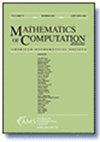随机Cahn-Hilliard方程的稳健后验估计
IF 2.1
2区 数学
Q1 MATHEMATICS, APPLIED
引用次数: 0
摘要
我们推导了随机Cahn-Hilliard方程的完全离散有限元近似的后验误差估计。将方程分解为一个线性随机偏微分方程和一个非线性随机偏微分方程,得到了后验界。所得到的估计对于界面宽度参数是鲁棒的,并且是可计算的,因为它涉及线性化(随机)Cahn-Hilliard算子的离散主特征值。此外,该估计对于拓扑变化以及随机噪声的强度具有鲁棒性。通过数值模拟验证了所提出的自适应算法的实用性。本文章由计算机程序翻译,如有差异,请以英文原文为准。
Robust a posteriori estimates for the stochastic Cahn-Hilliard equation
We derive a posteriori error estimates for a fully discrete finite element approximation of the stochastic Cahn-Hilliard equation. The a posteriori bound is obtained by a splitting of the equation into a linear stochastic partial differential equation and a nonlinear random partial differential equation. The resulting estimate is robust with respect to the interfacial width parameter and is computable since it involves the discrete principal eigenvalue of a linearized (stochastic) Cahn-Hilliard operator. Furthermore, the estimate is robust with respect to topological changes as well as the intensity of the stochastic noise. We provide numerical simulations to demonstrate the practicability of the proposed adaptive algorithm.
求助全文
通过发布文献求助,成功后即可免费获取论文全文。
去求助
来源期刊

Mathematics of Computation
数学-应用数学
CiteScore
3.90
自引率
5.00%
发文量
55
审稿时长
7.0 months
期刊介绍:
All articles submitted to this journal are peer-reviewed. The AMS has a single blind peer-review process in which the reviewers know who the authors of the manuscript are, but the authors do not have access to the information on who the peer reviewers are.
This journal is devoted to research articles of the highest quality in computational mathematics. Areas covered include numerical analysis, computational discrete mathematics, including number theory, algebra and combinatorics, and related fields such as stochastic numerical methods. Articles must be of significant computational interest and contain original and substantial mathematical analysis or development of computational methodology.
 求助内容:
求助内容: 应助结果提醒方式:
应助结果提醒方式:


